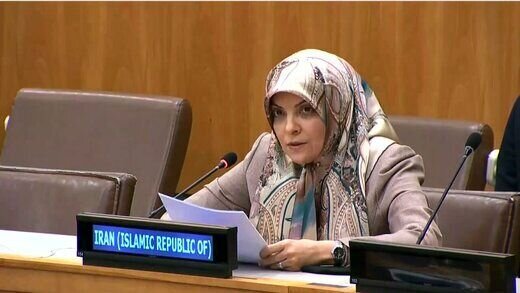Iran warns of humanitarian calamity in Afghanistan

TEHRAN - Zahra Ershadi, deputy permanent representative of Iran to the UN, has said that Afghanistan still faces the possibility of a humanitarian calamity.
The Iranian diplomat made the remarks in a statement to the Security Council of the United Nations which held a meeting on the situation in Afghanistan.
“We take note of the Secretary-General’s recent report on the situation in Afghanistan, and its implications for international peace and security. This report has provided a good update on the UN's activities in Afghanistan, including its humanitarian efforts. According to the report, the situation in Afghanistan has remained challenging and Afghanistan is grappling with a rising humanitarian crisis, a major economic downturn, the crippling banking and financial systems, and the challenges related to the establishment of an inclusive government. The risks of a humanitarian calamity remain. More than 20 million people, or half of the population, are still in critical need of assistance, and immediate action is required to avoid the economic collapse of the country,” Ershadi told the UN body.
She added, “We are deeply concerned about the potentially disastrous ramifications of this situation for the region's security and stability, particularly those of neighboring countries. If the situation is not addressed effectively, the country's socioeconomic collapse is possible, resulting in widespread destitution and a large influx of migrants into neighboring countries who are already overburdened with hosting millions of refugees. We, once again, urge the international community, particularly donor countries, to meet their responsibilities to Afghanistan's neighbors in order to assist refugees and displaced persons.”
Ershadi expressed Iran’s support for the United Nations' efforts to meet Afghanistan's expanding humanitarian needs.
She stated, “As we have emphasized on several occasions, the frozen assets of Afghanistan belong to the Afghan people and their release, which is critical for restoring the Afghan economy and saving lives, should not be politicized or conditional in any manner.”
The Iranian diplomat also highlighted Iran’s concerns on terrorist activities in neighboring Afghanistan.
Ershadi said, “Iran remains deeply concerned about terrorist activities in Afghanistan. According to the SG's report, terrorism is still a major challenge in Afghanistan. Attacks claimed or ascribed to ISIL-KP have intensified and spread outside its previously focused locations in Kabul and eastern Afghanistan. The United Nations has recorded 152 attacks by the group in 16 provinces between 19 August and 31 December 2021, compared to 20 attacks in five provinces during the same period in the previous year.”
She added, “This trend underlines the international community's continued demand that the Taliban must commit to fighting terrorism and ensure that Afghanistan is no longer a safe haven for terrorist groups like Daesh and Al-Qaida that have been responsible for heinous acts of terror, not only in Afghanistan, but throughout the region and beyond.”
Ershadi pointed out, “Of the same importance, the international community should continue to emphasize the need for establishing an inclusive and representative government in Afghanistan. We expect the Taliban to take serious steps to ensure the government's true ethnic and political inclusivity. To that end, Iran continues to engage with all parties in Afghanistan, including the Taliban, to address different challenges facing that country. The Taliban needs to be responsive to the demand for the establishment of an inclusive government that truly represents Afghanistan's multi-ethnic society.”
She stated, “The Taliban should also heed the international community’s call for the protection of human rights, particularly the rights of women and minorities. We continue to consult with Afghanistan's neighbors, as well as regional and international partners, including the United Nations, in order to assist Afghanistan in achieving long-term peace, security, and stability.”
Ershadi concluded, “And finally, we stress UNAMA's vital role in promoting peace and stability in Afghanistan, and support the extension of its mandate. We consider that the situation requires a strong UNAMA mandate in order to help the people of Afghanistan and maintain peace and security in that country.”
Leave a Comment